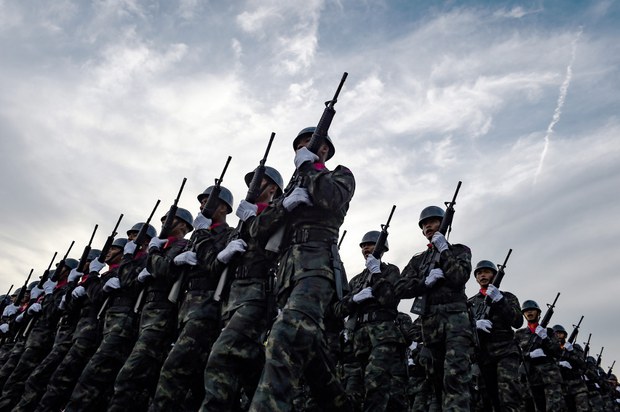Corruption on the Rise in Thailand, Bangladesh: Index
2017.01.25
Washington
 Soldiers march back to their barracks during Thailand’s National Armed Forces Day at the 11th Infantry Regiment in Bangkok, Jan. 18, 2017.
Soldiers march back to their barracks during Thailand’s National Armed Forces Day at the 11th Infantry Regiment in Bangkok, Jan. 18, 2017.
Military-ruled Thailand was among Asia-Pacific countries that performed the worst in fighting corruption last year, anti-graft watchdog Transparency International (TI) said Wednesday in issuing its annual rankings of nations.
Thailand’s rating plummeted by 25 points on TI’s Corruption Perceptions Index for 2016, compared with its ranking for 2015.
Elsewhere in Southeast Asia, Malaysia and Indonesia saw declines in their index rankings, as did the South Asian nations of Bangladesh and India. The index measures the depth of corruption in the public sectors of nations across the globe.
“Poor performance can be attributed to unaccountable governments, lack of oversight, insecurity and shrinking space for civil society, pushing anti-corruption action to the margins in those countries,” Berlin-based Transparency International said about the Asia-Pacific region in a statement accompanying the publication of its latest rankings.
“High-profile corruption scandals, in addition to everyday corruption issues, continue to undermine public trust in government, the benefits of democracy and the rule of law.”
Thailand, which was taken over by the military in a coup nearly three years ago, ranked 101 out of 176 nations surveyed by the watchdog in 2016. The previous year, it stood at No. 76 out of 168 nations surveyed.
A country ranked No. 1 is considered by TI to be the least corrupt in the world. This year, that honor went to Denmark and New Zealand, which tied for No. 1 out of 176 countries.
Apart from ranking each country, the index assigns each country a score – with 100 the best score – to gauge its performance in fighting corruption. TI gave Thailand a score of 35, down from 38 least year.
“Thailand's new constitution, while it places significant focus on addressing corruption, entrenches military power and unaccountable government, undermining eventual return to democratic civilian rule,” the report said, adding, “There is a clear absence of independent oversight and rigorous debate.”
‘We are failing’
Bangladesh saw a six-point drop in its rankings. It was ranked among the world’s most corrupt countries, and rated the worst for corruption in South Asia, according to TI.
The NGO ranked Bangladesh 145th in 2016, compared with its rank of 139th in 2015. Bangladesh also scored 26 in its efforts to fight graft, up one notch from last year.
“There is nothing to be happy with Bangladesh’s position in the corruption scenario. We are basically stacked in a certain position. We are failing to change the situation,” Sultana Kamal, chairperson of the Bangladesh office of Transparency International, told a news conference in Dhaka on Wednesday.
Neighboring India, South Asia’s largest country, dropped three points on the TI rankings. It ranked 79th and scored only 40 points out of 100, according to the index.
The performance landed India on TI’s Watch List for 2017.
India’s dismal performance “reiterates the state’s inability to effectively deal with petty corruption as well as large-scale corruption scandals. The impact of corruption on poverty, illiteracy and police brutality shows that not only the economy is growing – but also inequality,” the report said.
‘Completely corrupt’
Transparency International also highlighted Malaysia’s performance, noting the 1MDB financial scandal that has embroiled Prime Minister Najib Razak in corruption allegations.
“The Prime Minister’s deficient response, and what role this will play in upcoming elections, is something to watch in 2017,” TI said.
Najib has denied any wrongdoing over a controversy around nearly $700 million of money linked to state investment fund 1Malaysia Development Berhad that was deposited into his private bank accounts in 2013. However, his government has gone after critics and proponents of clean government who have called for him to resign over the allegations.
“There is a Chinese proverb which says, ‘if the upper beam is not straight, the lower ones will go aslant.’ To keep a system ‘clean’ and effective, a country’s top leader must send a clear signal that he/she is committed to eradicate corruption,” Akhbar Satar, president of the Malaysian chapter of Transparency International, told BenarNews.
Malaysia dropped a point to be ranked at No. 55 on the 2016 index.
Commenting on Malaysia’s latest index ratings, Cynthia Gabriel, executive director of the Malaysian NGO Center to Combat Corruption and Cronyism (C4), said she had expected Malaysia to fall more sharply.
“The solution to really combat corruption lies in political will. But that would be difficult to imagine in this current situation, given that the highest political leadership is completely corrupt and have curtailed civic rights at the expense of holding on to political power. All efforts at reforms are coming to naught,” she told BenarNews.
Neighboring Indonesia fell two places, and ranked No. 90 in the world last year. Yet the country led by President Joko “Jokowi” Widodo, who was elected in 2014 on a platform of reforming Indonesian politics and eliminating corruption, scored only 37 out of 100 in anti-graft efforts, up one point from last year.
Hata Wahari and Ray Sherman in Kuala Lumpur, and Pulack Ghatack in Dhaka, contributed to this report.







